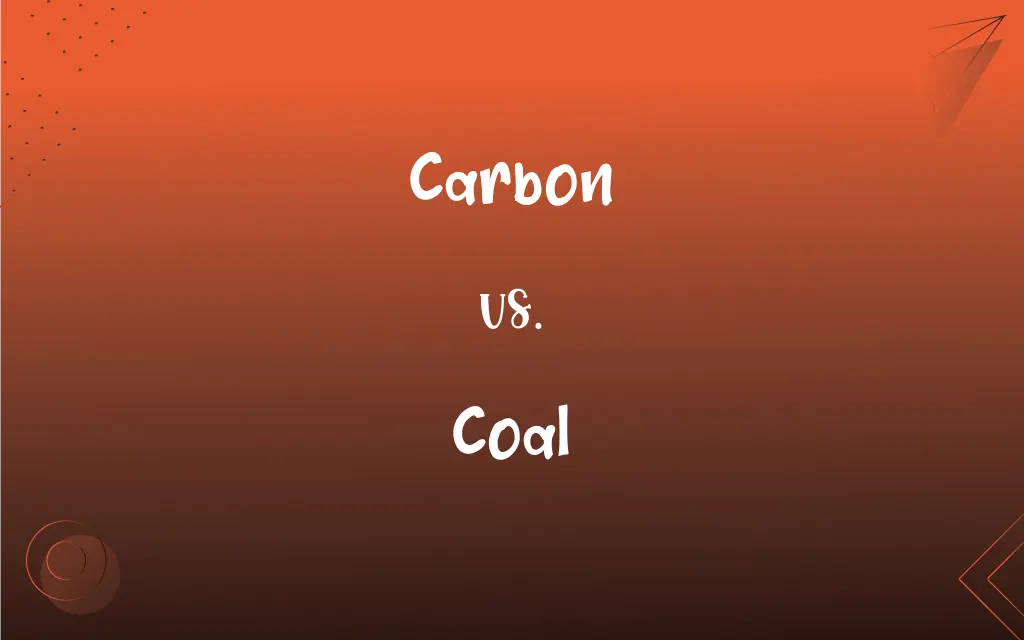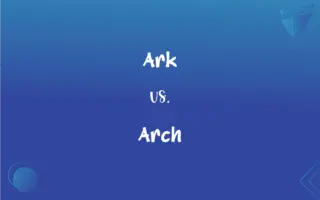Carbon vs. Coal: What's the Difference?
Edited by Aimie Carlson || By Janet White || Updated on November 22, 2023
Carbon is a fundamental chemical element found in all living things and various materials, while coal is a combustible black or brownish-black sedimentary rock, rich in carbon.

Key Differences
Carbon is a basic chemical element, symbolized as 'C' on the periodic table, essential to all known life forms. Coal is a specific type of rock, primarily composed of carbon along with various other elements, used primarily as a fuel source.
Carbon exists in multiple forms, including diamonds, graphite, and as part of organic compounds in living organisms. Coal is a fossil fuel formed from the remains of ancient plants, subjected to high pressure over millions of years.
The use of carbon is diverse, ranging from its role in organic chemistry and life processes to its applications in materials science. Coal is primarily used for generating electricity and as a raw material in industrial processes.
Carbon is a fundamental building block of nature and is present in the Earth's atmosphere as carbon dioxide, contributing to the greenhouse effect. Coal mining and combustion release significant amounts of carbon dioxide, impacting the environment and contributing to climate change.
While carbon in its various forms is integral to the structure of organic molecules and materials, coal represents a stored form of carbon that is a key player in energy production and industrial processes, but with environmental implications.
ADVERTISEMENT
Comparison Chart
Definition
A chemical element essential for life and various materials.
A combustible sedimentary rock, rich in carbon.
Forms
Exists in diverse forms like graphite, diamond, CO2.
Typically found as a black or brownish-black rock.
Usage
Used in a wide range of applications across various fields.
Primarily used as a fuel for electricity and industrial processes.
Natural Formation
An element present in all living organisms and materials.
Formed from decomposed plant matter over millions of years.
Environmental Impact
Part of the natural carbon cycle but can contribute to greenhouse gases.
Mining and burning coal significantly contributes to CO2 emissions.
ADVERTISEMENT
Carbon and Coal Definitions
Carbon
Found in various allotropes, like graphite and diamond.
Diamond, a form of carbon, is one of the hardest natural substances.
Coal
A black or brownish-black sedimentary rock, used as fuel.
Coal-fired power plants generate a significant portion of the world's electricity.
Carbon
Used in materials science for its unique properties.
Carbon fibers are known for their strength and lightweight.
Coal
Formed from the fossilized remains of ancient plants.
Coal deposits are often found in former swamp regions.
Carbon
Integral to organic chemistry and biochemistry.
Carbon atoms form the backbone of organic molecules.
Coal
Contributes to environmental issues like air pollution.
Burning coal releases pollutants that affect air quality.
Carbon
A chemical element with symbol C, essential to life.
Carbon compounds are the basis of all known life.
Coal
A major source of energy in industrial processes.
Steel production often relies on coal as a source of carbon.
Carbon
A component of atmospheric gases like carbon dioxide.
Carbon dioxide levels in the atmosphere are rising due to fossil fuel combustion.
Coal
Mined from underground or surface mines.
The coal mine employed hundreds of workers in the region.
Carbon
Symbol C An abundant nonmetallic element that occurs in many inorganic and in all organic compounds, exists freely in amorphous, graphite, and diamond forms and as a constituent of coal, limestone, and petroleum, and is capable of chemical self-bonding to form an enormous number of chemically, biologically, and commercially important molecules. Other significant allotropes include fullerenes and nanotubes. Atomic number 6; atomic weight 12.011; sublimation point 3,825°C; triple point 4,489°C; specific gravity of amorphous carbon 1.8 to 2.1, of diamond 3.15 to 3.53, of graphite 1.9 to 2.3; valence 2, 3, 4. See Periodic Table.
Coal
A natural dark brown to black graphitelike material used as a fuel, formed from fossilized plants and consisting of amorphous carbon with various organic and some inorganic compounds.
Carbon
A carbon-containing gas, notably carbon dioxide, or a collection of such gases, especially when considered as a contributor to the greenhouse effect
Plans for capturing and sequestering carbon produced by power plants.
Coal
A piece of this substance.
Carbon
A sheet of carbon paper.
Coal
A glowing or charred piece of solid fuel.
FAQs
What is carbon?
Carbon is a chemical element, symbol C, atomic number 6, and a key component of all known life on Earth.
What are the different forms of carbon?
Carbon exists in several forms, including graphite, diamond, and amorphous carbon.
What are carbon's primary uses?
Carbon is used in various industries, including steel production, filters, and as a key component in organic chemistry.
Where is carbon found?
Carbon is found in many forms, including in living organisms, the atmosphere (as carbon dioxide), and in fossil fuels like coal and petroleum.
Is carbon a solid, liquid, or gas?
At room temperature, pure carbon is a solid.
How does carbon affect the environment?
Carbon, in the form of carbon dioxide, is a greenhouse gas and contributes to global warming.
What is carbon's role in the carbon cycle?
Carbon cycles through the environment via processes like photosynthesis, respiration, and decomposition.
How is coal formed?
Coal is formed from dead plant matter that decays and transforms under high pressure and temperature over millions of years.
Is coal renewable?
No, coal is a non-renewable resource due to its formation process taking millions of years.
How does coal affect the environment?
Burning coal releases pollutants and greenhouse gases, contributing to air pollution and climate change.
Can coal be converted into other forms of energy?
Yes, coal can be converted into electricity and synthetic fuels.
Can carbon form compounds?
Yes, carbon can form a vast number of compounds, more than any other element, due to its ability to form chains and rings.
Is carbon harmful to humans?
Carbon itself is not harmful; however, some carbon compounds, like carbon monoxide, are toxic.
What are the types of coal?
The main types are lignite, sub-bituminous, bituminous, and anthracite, ordered from least to most carbon content.
What are coal's primary uses?
Coal is mainly used for electricity generation and as a fuel source for industrial processes.
How is carbon dated?
Carbon dating measures the decay of carbon-14 to estimate the age of organic materials.
Where is coal found?
Coal deposits are found worldwide, with major reserves in the USA, Russia, China, and India.
What is coal?
Coal is a combustible black or brownish-black sedimentary rock composed mostly of carbon and hydrocarbons.
What is clean coal technology?
Clean coal technology aims to reduce the environmental impact of coal usage by capturing and storing carbon emissions.
How is coal extracted?
Coal is extracted through mining, which includes surface and underground methods.
About Author
Written by
Janet WhiteJanet White has been an esteemed writer and blogger for Difference Wiki. Holding a Master's degree in Science and Medical Journalism from the prestigious Boston University, she has consistently demonstrated her expertise and passion for her field. When she's not immersed in her work, Janet relishes her time exercising, delving into a good book, and cherishing moments with friends and family.
Edited by
Aimie CarlsonAimie Carlson, holding a master's degree in English literature, is a fervent English language enthusiast. She lends her writing talents to Difference Wiki, a prominent website that specializes in comparisons, offering readers insightful analyses that both captivate and inform.































































